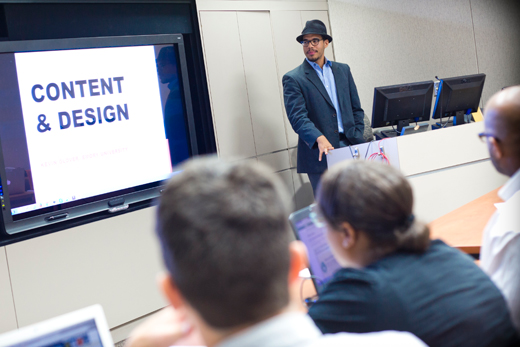More than 20 librarians from the Historically Black Colleges and Universities Library Alliance spent the week of June 16-20 at Emory learning about digital tools for blogging, compiling online exhibits and creating mobile tours.
The Emory Center for Digital Scholarship and Woodruff Library sponsored and hosted the institute, supported by a grant from the Andrew W. Mellon Foundation awarded to support digital scholarship and new directions in library professionalization.
"ECDS was interested in how we might collaborate in a digital training project with some other organization that was not Emory-based, but that would extend our work across the metro Atlanta region, or beyond," said Allen Tullos, co-director of ECDS.
The librarians spent the week learning how to use Omeka, a free web application for creating online digital collections; WordPress, a blogging platform; and how to create a tour for mobile devices, similar to the one the ECDS used in creating its newly debuted Battle of Atlanta mobile tour.
"Relevant activities and tools were chosen based on the project interest gathered during the application process," Emory Librarian Yolanda Cooper said.
Applicants, who came from around the country, were asked to identify particular projects to work on during the institute, explained Sarah Melton, ECDS digital projects coordinator. Institute participants also attended sessions on general issues in digital scholarship, including data management, copyright and permissions, and user design.
"Participants may not have a completed exhibit, website, or tour by the end of the institute, but everyone should be able to come away with something tangible to show and an understanding of some of the key issues in digital scholarship," Melton said.
Emory will continue to support participants as they continue working on their projects after the institute, Cooper noted.
"At the end of the institute each attendee will then return to their institution with the beginnings of a project they will complete in their own environment. ECDS will remain in contact with the attendees for consultation and a virtual presence will be established for communication and dissemination of project progress and finished products," she said.
'You can help each other'
Participants in the institute said they learned both from the Emory instructors and each other.
"I was hoping to learn something new and be inspired by the instructors and my colleagues, to get ideas on a project I have set up on how to best approach setting it up in a digital context," said Jean Greene from Hinds Community College in Utica, Mississippi.
Greene said the first day's confusion cleared up the second day with practical hands-on time. "I had so much to learn and I was really in the best place to learn what I needed because the people that have been assigned to us have a wealth of knowledge and patience," she said.
Katherine Hayes from Bowie State University in Bowie, Maryland, said networking with colleagues is critical because you learn how they approach solving similar problems. "You can help each other," she said.
"Even outside the context of the projects," Greene chimed in.
Most of the participants’ projects are similar, designed to promote specific features of their schools.
Sharon McGee from Kentucky State University in Frankfort, Kentucky, said she wanted "to learn some new technologies to take back to our school and showcase our special collections."
Atlanta University Center’s Trashinda Wright came to the institute hoping to expand her knowledge of Omeka, but now wants to finish up her Omeka project so she can start on the mobile app.
"I was impressed by that. I think that's something our library can use," she said, listing possibilities for a campus tour or a library tour exploring different departments and different exhibits.
Bowie State University is approaching its sesquicentennial and Hayes needs to create a way to display the school’s history.
"I'd come up with the idea of doing a timeline and I'm now rethinking that, looking at technology that is being presented here and what options I have to do something without spending any money and the limited resources I have," Hayes said.
Making the project in a digital format "can reach the widest number of people, not only students on campus but alumni and people who have moved away and the wider public, making them aware that our institution is the oldest HBCU in Maryland," she said.
Sharon Hall-Smith of Tennessee State University in Nashville was also motivated to attend the institute by an upcoming milestone anniversary for her school. She jumped at the opportunity after her director told her it would be great if she could build an online exhibit for the 125th anniversary of the university's founding.
Hall-Smith described the week's information as "jam-packed."
"It's a lot of information compressed in this short amount of time. But I'm learning a lot," she said. "I wish this could be two weeks instead of one."

